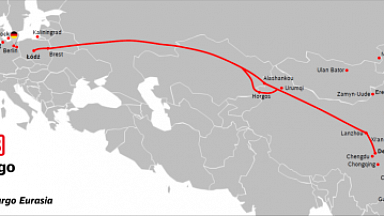It was in the middle of the Chinese Lunar New Year, one of the most important national holidays in a year, when the Global Times reporter visited the station. Many traders have no time to stay at home with their families as they are preparing for the busy shipping season, which has come right after the Chinese New Year holidays that ended on Saturday.
Acting as a major transportation hub in the China-Europe rail freight route, the Putian Railway Station has historically been at the heart of the country’s railway network.
In 2023, China-Europe freight train service in Zhengzhou saw a marked increase in both the volume and value of shipments, with manufactured high-tech products becoming a main source of cargo, the Global Times learned from China Railway Zhengzhou Group.
The Putian station has manifested the great opportunity for China-Europe rail freight service. From Shanghai to Changsha, Central China’s Hunan Province, the long-distance train service has seen a busy start in early 2024.
Rail freight has proven to be more reliable and economically competitive, as the world grapples with global challenges such as the Red Sea crisis. Experts said that the busy scenes at the cross-border cargo loading yard at Putian station also reflects the strong outlook of China’s foreign trade in 2024, defying Western claims of weak global demand for Chinese goods.
Demand for Chinese goods
As an important hub of China’s increasingly complicated railway network, Zhengzhou has leveraged its position to build on a wealth of business opportunities and shore up its transportation capability, industry analysts said.
Goods from major manufacturing and trade regions such as North China’s Hebei Province, East China’s Shandong and Zhejiang provinces often find their way to Zhengzhou, where they embark on their journey to Europe aboard the China-Europe freight train, Kong Weidong, head of the THI Group’s Zhengzhou branch, told the Global Times.
The shipments are processed at customs in Zhengzhou and then transported directly to customers across Europe, with main destinations including Germany, Italy, the Netherlands, Poland, the Czech Republic and many other European countries, Kong said.
Kong added that this year would be a stronger year for cross-border commerce development, as exemplified by the robust China-Europe freight train service his company has operated in Zhengzhou.
«In 2023, we dispatched 7,000 containers via the train service, and we anticipate a growth rate of some 70 percent in 2024,» Kong said.
The safety, speed, and reliability of the China-Europe freight train are attracting more and more customers. According to Kong, the Red Sea crisis has highlighted the train service’s advantages.
Since the inaugural operation of the China-Europe freight train service in Zhengzhou on July 18, 2013, the city has become a major juncture for rail traffic between China and Europe. In 2023, the city operated a total of 3,269 freight train runs. In 2024, more than 3,500 freight trains are expected to be dispatched, marking a 7 percent year-over-year growth, according to Zhongyu Port Group, the operator of China-Europe freight train in Zhengzhou.
And, the rapid expansion of the China-Europe freight train service has been boosted by the development of the Zhengzhou Airport Economy Zone and the city’s growing freight handling capacity, as the city accelerates the construction of an inland port hub.
The goods transported by the China-Europe freight trains are constantly changing. In addition to carrying traditional items such as clothing, furniture, and household goods, the export of new energy vehicles and photovoltaic gear has seen a significant rise since the first half of 2023, Kong said.
Zhengzhou is not alone. The China-Europe freight train business in Shanghai also reported a good start this year.
Tommy Tan, president of Shanghai EPU Supply Chain Management Co, told the Global Times in a recent interview that the volume of both imports and exports via the China-Europe freight train service operated by his company in January saw monthly double-digit growth.
Stronger trade relations
After a decade of high-quality development, China-Europe freight trains can complete a single trip from China to Europe in about 12 days, with simpler clearance and loading procedures, which is much faster than sea trips that often take 35 to 45 days, according to Tan.
The China-Europe freight train service not only brought development opportunities for Zhengzhou city but also increasingly cemented its significance in the economic and trade exchanges between China and Europe.
As of February 1 this year, over 84,000 China-Europe freight trains were operated, connecting 219 cities across 25 European countries, according to media reports.
The share of train-transported goods in total trade between China and Europe increased from 1.5 percent in 2016 to 8 percent in 2022, official data showed.
The China-Europe freight trains are playing an increasingly important role in connecting Chinese and European markets, facilitating bilateral trade exchange, Zhang Hong, an associate research fellow at the Institute of Russian, Eastern European and Central Asian Studies of the Chinese Academy of Social Sciences, told the Global Times.
Despite rising protectionism pursued by some Western countries, demand for trade between China and Europe remains substantial, with the markets of China and Europe being largely complementary, Li Yong, a senior research fellow at the China Association of International Trade, told the Global Times, noting that the strong bilateral trade will boost further development of China-Europe economic relations.




